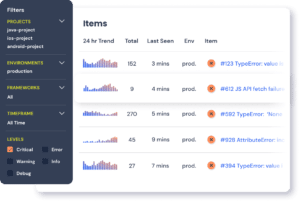When a program encounters an exception during execution, it is terminated if the exception is not handled. By handling multiple exceptions, a program can respond to different exceptions without terminating it.
In Python, try-except blocks can be used to catch and respond to one or multiple exceptions. In cases where a process raises more than one possible exception, they can all be handled using a single except clause.
There are several approaches for handling multiple exceptions in Python, the most common of which are discussed below.
Install the Python SDK to identify and fix exceptions
Using Same Code Block for Multiple Exceptions
With this approach, the same code block is executed if any of the listed exceptions occurs. Here's an example:
try:
name = 'Bob'
name += 5
except (NameError, TypeError) as error:
print(error)
rollbar.report_exc_info()In the above example, the code in the except block will be executed if any of the listed exceptions occurs. Running the above code raises a TypeError, which is handled by the code, producing the following output:
cannot concatenate 'str' and 'int' objects
Using Different Code Blocks for Multiple Exceptions
If some exceptions need to be handled differently, they can be placed in their own except clause:
try:
name = 'Bob'
name += 5
except NameError as ne:
# Code to handle NameError
print(ne)
rollbar.report_exc_info()
except TypeError as te:
# Code to handle TypeError
print(te)
rollbar.report_exc_info()In the above example, NameError and TypeError are two possible exceptions in the code, which are handled differently in their own except blocks.
Investigating Exceptions using If, Elif, Else Statements
Exceptions can also be checked using if-elif-else conditions, which can be useful if the exception needs to be investigated further:
import errno
try:
f = open('/opt/tmp/myfile.txt')
except IOError as e:
rollbar.report_exc_info()
if e.errno == errno.ENOENT:
print('File not found')
elif e.errno == errno.EACCES:
print('Permission denied')
else:
print eHere, the variable e holds an instance of the raised IOError. The additional status code of the exception is checked in the if, elif and else blocks and the first match is executed:
File not found
Multiple Except Clauses Matching
There may be cases where a piece of code causes an exception that can match multiple except clauses:
try:
f = open('/opt/tmp/myfile.txt')
except EnvironmentError:
rollbar.report_exc_info()
print('Failed to open file')
except IOError:
rollbar.report_exc_info()
print('File not found')Since EnvironmentError is more general than IOError, it matches the exception in the code above. The EnvironmentError except clause is listed first, so the code within it gets executed, producing the following output:
Failed to open file
Track, Analyze and Manage Errors With Rollbar

Managing errors and exceptions in your code is challenging. It can make deploying production code an unnerving experience. Being able to track, analyze, and manage errors in real-time can help you to proceed with more confidence. Rollbar automates error monitoring and triaging, making fixing Python errors easier than ever. Sign Up Today!





